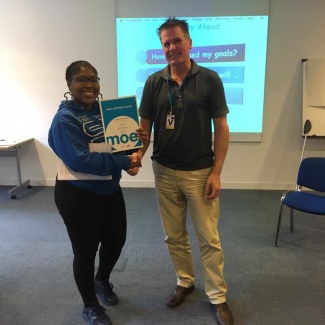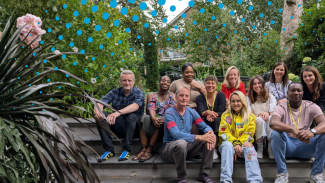Learningaboutcoaching
Our service delivery manager, Simone Ujah, writes about what she learnt on the Ministry of Entrepreneurship (MOE)’s Coach Training course and how learning coaching skills has positively impacted on the young people she works with.
Simone organises our award-winning Hero’s Journey™ workshops and engages young people in prison with our transformative coaching process, working in HMYOIs Feltham and Isis, and HMPs Wormwood Scrubs and Wandsworth.
Introducing young people in prison to our Hero’s Journey™ programme, as well as introducing them to coaching, has its challenges. Explaining to a young person what coaching is can be difficult, which makes it especially important that I have a good understanding myself, of what coaching is and how it can benefit young people. I wanted to gain a deeper understanding of the practice, so I contacted the organisation Ministry of Entrepreneurship (MOE), which provides coaching and mentoring to unlock the purposeful, entrepreneurial spirit in current and future generations, and actively showcases the strengths and talents of young people.
I learnt a number of coaching models and techniques throughout the five days on the course, as well as learning more about myself. The course has increased my confidence in being able to explain exactly what coaching is to young people, using a simple sentence: coaching supports self awareness in people. I also ask them the question ‘what comes to mind when I say life coaching?’. This has opened up the levels of communication I have with young people in prisons during pre-engagement – they are curious to know more about the coaching, the workshops and how our programme can benefit them. Our structured life coaching programme for young people aged 15 to 25, builds young people’s motivation to change, reduces in-prison violence, and ultimately reduces reoffending. MOE believes that coaching is vital in life to build a level of self-awareness, confidence, resilience and a positive future outlook.
The course taught me the 5 different levels of communication – from interrupting through to attentive and active listening. Understanding the different levels of communication has increased my awareness of the potential for coach-able moments when speaking to young people. By using my attentive and active listening skills, combined with my youth work skills, I support the young person to explore what coaching is, how they set their own agenda for the coaching sessions, and what they would like to achieve from starting the coaching process. As a result of this, young people come into our workshops intrigued by what they might learn about themselves.
I am very pleased to say that on completion of this course I am now a MOE Certified Coach.
My overall experience of the course was enjoyable, fun and challenging. We all started as strangers, but as we embarked on this journey together we have become a community of new coaches, keen to share experiences and begin to embed our new coaching skills in our day to day lives.
This course has been eye-opening for me, as I began to think about the type of sessions the young people were having with our coaches and just how many more young people I can introduce to this! The course has equipped me with the knowledge that has already tailored my approach to explaining coaching to young people and engaging them onto our programmes.

I am very invested in sharing coaching with as many people as possible, and will always apply my coaching skills to help support people to realise and reach their full potential.
Want to know more about our coaches? All of our professional life coaches are fully accredited by the International Coaching Federation, the European Mentoring and Coaching Council, or the Association for Coaching. Our team combined have more than 1,500 hours of practice, with previous experience working in the criminal justice system, in alcohol or drugs recovery, mental health, or youth work.


